#queer system culture is
Explore tagged Tumblr posts
Note
Queer system culture is thinking we were genderfluid and abrosexual before realizing that we were a system
Happens to the best of us, is like:
"My orientation and identity always fluctuates, I wonder why"
*System discovery* "Oh look, I'm a system"
"..."
"WAIT A MINUTE-"

#queer system culture is#queer system#queer sys#lgbtq sys#lgbtq system#queer community#queer#lgbtq#lgbtq community#endos dni#cdd system#dissociative identity disorder#complex dissociative disorder#cdd community#osddid system#osddid#did osdd#did system#osdd#pdid#cdd#pwcdd#did community#did#osdd system#cdid#osdd community#osddid community#pdid system#system stuff
80 notes
·
View notes
Note
Queer traumagenic culture is freaking out about a new split fitting into stereotypes because of trauma from gender related issues
.
#system culture is#traumagenic culture is#queer system culture is#anon#plurality#actually plural#actuallyplural#plural system#pluralgang#queer#traumagenic
13 notes
·
View notes
Text
Remember kids,
We're a system, not a cistem.
#plurality#actually plural#plural system#pluralgang#plural culture is#trans#transgender#lgbt pride#queer#lgbtq#nonbinary#gender#enby#non binary#osdd system#did system#traumagenic system#system stuff
247 notes
·
View notes
Text
This captures it. Chappell Roan is rightfully disillusioned by the two-party system.
Here are some of the correct responses to her (justified) criticism of the U.S. government.













#a lesser evil is still evil how don’t Americans understand this#it’s her fault she understand critical thinking and nuance bc we know most Americans have no idea what these things mean#she’s an ardent supporter of Palestine and of oppressed communities ofc she doesn’t fuck with the two party system#I’m begging Americans to think critically and educate themselves#but I suppose it’s not their fault that their government keeps them stupid on purpose#y’all would freak out if you ever met real life political dissidents#the two party system does not have the best interest of the people in mind they’re all greedy corporate elites#free palestine#chappell roan#taylor swift#bc she is mentioned and compared here#neolibs are the most insufferable bootlickers#these are the correct responses to government criticism btw#us politics#politics#palestine#us elections#celebrities#celebrity worship#pop culture#jill stein#climate collapse#queer#lgbt#lgbtq#lgbtqia#lgbtq community#lgbt pride#Zionism is a disease
60 notes
·
View notes
Text
so. June. Pride Month.
listen, i love pride month. obviously. but partly as a consequence of being Terminally Online, partly because my country's pride month is in July which means all the actual in-person events don't start for another 30 days, often my first association with it is All The Discourse Posts
which means every year i have to physically restrain myself from making in-universe Pride discourse for different fictional universes
#pride month#this year it's Temeraire#i can see it so clearly#'just a reminder that while dragons can attend pride events they need to be making room for actual queer people'#'uhh dragons can be gay karen'#'while they can technically be homosexual they've never had any systemic or cultural discrimination on that front so it doesn't count'#'uhhh well the same can be said for human queer people in plenty of countries and cultures around the world??#are you saying they don't count either?'#'wow great way to erase the vital contributions dragons made in repealing sodomy laws in Europe'#'weird way to describe Iskierka literally setting the Dover courthouse on fire'#'so everyone is Be Gay Do Crimes until the crime is arson and the person's a dragon?'
143 notes
·
View notes
Text
punk as in i support SW
punk as in i support all plurality
punk as in i support “contradictory” or “cringe” queerness
punk as in i support all disabled people
punk as in i support alterhumans/nonhumans
punk as in i support
#pro endo#queer inclusion#punk#anarchist#anarchy#anti capitalist#ecopunk#plural#nazi punks fuck off#endo safe#sw is real work#pluralpunk#plural positivity#plural pride#pluralgang#plurality#plural system#syspunk#beastpunk#alterhuman#otherkin#fuck humans#fuck social norms#cringecore#cringe culture is stupid
77 notes
·
View notes
Text
Something we feel so proud of is that the stuff that usually gets marked off as “cringe culture” or gets told “go touch grass” n shit is coexisting with our diligence and resiliency in life.
You can be otherkin whilst being an absolute badass in the coding field.
You can be a furry while creating ground-breaking research and vaccines.
You can be a system/have a CDD and run your own psychology practice.
You can have neopronouns and use xenogenders while being a nurse.
You can be successful while holding identity labels that are made fun of and looked down on.
Our psychiatrist doesn’t believe we have DID because “we function to well,” but that just feels like a disservice to ourselves. Our DID has helped us function and progress through life, making us one of the most resilient persons. Sometimes we feel bad about our identity stuff (xenos, neos, neurodivergency impacts, otherkin, etc) because people don’t understand what they mean. We sometimes feel like, because we have labels that may not make sense, we are of less value. We feel like we contribute less to society.
That’s not true though, and it isn’t for many people in the group either. We are all trying our best to survive. Just because society thinks we’re “cringe” doesn’t mean we don’t contribute. We’re some of the top contributors out there!
Be proud of who you are, and be the person you wish someone was for you. You never know how many little kids are looking for people like us in their dream careers or lives.
#system pride#system#plural#did#osdd#otherkin#xenogender#neopronouns#neurodivergence#neurodivergency#osdd community#osdd system#osddid#pluralgang#actually osdd#did community#autistic plural culture#actually autistic#actually autism#adhd#autism#autistic#actually adhd#adhd stuff#queer unity#queer#queer community#non binary#nonbinary#system community
47 notes
·
View notes
Text
You can't just have Elton John sing lyrics like "oath of silence for the voice of a generation" and "you are what you love not who loves you" and expect me not to get emotional.
#fall out boy#patrick stump#elton john#pete wentz#joe trohman#andy hurley#they knew what they were doing#i like elton johns music a lot but his importance to queer culture and culture at large can not be overstated#he is the voice of generation#a generation that was brutally taken from us#sure they were killed by a disease but don't tell me that political inaction born of homophobia didn't also kill those people#do I think hating one political figure shows a good understanding of politics? no the system was and is more complex than that and always#has been but Regan does make a good case for himself#after years of inaction with lots of people dying of aids when he finally was forced to confront this#you know whom he appointed?#a catholic navy admiral#that man knew nothing of disease and how they spread#but history bit regan in his ass because Watkins actually did a great job and really got stuff done and advocated for queer people
90 notes
·
View notes
Note
Alloaro culture is wanting a similar word to qpr for a committed partner you have sex with sometimes that is not romantic: qpr isn’t right because it has the word platonic in it.
hi! in a very gentle way, i am vibrating to let you know this is incorrect :)
from the POV of someone who's been around the aro community since ~2013-2014 on tumblr, the only time i've seen folks start to say that qprs couldn't include sexual components has been when
they've learned an incorrect definition of QPRs, or
in one particularly notable case, the individual proposing it turned out to be quite sex negative and upset at the mere thought that people could think that qprs could include sexual activity. this individual suggested an alternative term for individuals desiring sex in QPRs in a rather explicitly alloarophobic measure. when gently called out from what had seemed to be a genuine attempt at coining a new term, the above came to light. smaller cases of this pop up every once in a while, but this one got some notoriety.
queerplatonic was always meant to mean "queering the idea of a platonic relationship", "queering the idea of what a relationship means", and by explicit definition, has always been broadly and radically inclusive. any relationship, so long as the partners involved agree it is a queerplatonic one, is queerplatonic. no exceptions. this can mean it involves romance, sex, traditionally platonic elements, and anything and everything those involved desire out of it.
tldr; the word platonic is in queerplatonic to say it is counter to the idea of a restricted "platonic" relationship.
#Anonymous#aro culture is#aro#aromantic#actually aro#actually aromantic#ask#mod phoenix#pls don't ask me what the term had been or who the blogger was. i forgor#idk when it was anymore either cause it was uuuuhhhhh really distressing#i do think this blog existed tho so probs 2019 ish#sex negativity cw#alloarophobia cw#queerplatonic#i know it can be easy to get an incorrect or like. sanitized take online of what things mean#but generally speaking if the word is queer + [something] that [something] is being modified to be counter-cultural intuition#not just queer people *doing* the culturally intuitive version of that word#like... our system is genderqueer broadly speaking [i ID as agender or genderfuck primarily but most of the system also IDs as genderqueer]#and trust me this is not queer person doing Cis Binary Gender this is queer person says 'fuck that gender shit imma do what i want :)'#also pretty please know this is all being said in like. a smiling happy-to-share way!#this is not being said as like. 'uhhhhm aktually' mansplaining
342 notes
·
View notes
Text
Empsys, Empsyse
("emp-sis"), ("emp-seas")
A reclaimation of the "empty system" term. This isn't to claim that empty systems are bad or their term is not good, it is to create a new culture surrounding empty systemhood and how it functions.


What is an empsys?
An empsys is a person who exists alone in a headspace/system for any reason, and is sometimes accompanied by other people at random intervals. An empsys does not need to be plural, and yet is aligned with being a plurallet.
The system can either choose an empsys or one can be selected at random. This is called a selected emp and a random emp.
How does one become an empsys?
Empsyse usually experience fusion, system collapse, hopping, or migration. All possibilities result in different kinds of empsyse.
Fusion - Empsyse left behind by fusion tend to have behaviors reminiscent of previous people who are now unified with said empsys. Can be caused by stress, trauma, coercion, etc.
Collapse - Empsyse that go through this are either normalized to the collapse through cycles, or experience a sudden disappearance of people in a short time. Can be caused by stress, trauma, coercion, etc.
Dormancy - Empsyse left behind by dormancy of other people. Caused by any factor.
Hopping - Empsyse left behind are usually not left alone for too long when people hop. Can be voluntary or involuntary.
Migration - Also known as Moving Out, empsyse who are left behind are most likely the permanent resident of the system who watches others leave to another world/reality. Voluntary.
Terminology
So far, I have not seen definite terminology other than "fused empty system" being used frequently. Here are some empty system related terminology.
Displural - Someone who was previously plural system but now is not, and integration or fusion doesn't describe their experiences.
Corelet - The remaining headmate in an empty system.
UTB System - "Used-to-be" system. Once plural, now a singlet.
Backroomtien - "...Headmates seem to have 'no-clipped' out of the system."
Abysstien - "...empty system that fluctuates between having more than one member, but always inevitably goes back to having one."
Daromate - Imaginary mental figments based on headmates that had left, fused, or migrated from the system.
Comprestite - An umbrella term for any causation to empty systems.
FAQ
For those who are empsyse.
Why do empty system spaces feel so desolate/depressive?
Systemhood is seen as this collective thing rather than an interpersonal journey with how you as the individual headmate experiences life with others you cannot always see/hear, but know they exist with you somehow. Since empty systemhood breaks that, whether intentional or not, it's no longer seen as system "enough" and is evaluated as being a singlet space. It can seem depressing because most if not all empsyse there just lost their friends, family, loved ones to comprestitude.
How does one adjust to being an empsyse?
Depending on who or what kind you are, it gets difficult as it goes. Some empsyse never adjust, others use methods such as journaling or reminding yourself that you are with them as one.
Can an empsys regrow the system?
Again, that varies. At certain intervals, people can just show up in the system again from wherever they disappeared from. It is possible for them to voluntary do so as well, with tulpamancy/willogenic origins - though I have not heard of any voluntary regrowth.
@empty-system-culture-is
@radiomogai
#queer#liom#mogai#liom term#mogai term#flag#flag making#flag coining#pride flag#mogai flag#plurality#plural system#plural community#plural culture is#plural stuff#plural gang#actually plural#mixed origin system#pro endo#endo safe#tulpa safe#tulpamancy#empty system#empsys
26 notes
·
View notes
Note
My favorite thing about being a queer system is that the only two female presenting alters (me, a gxrl alter, and a femme enby) are the “transmasc protectors”, our body is AFAB, we're legally male, and collectively agender seeking male presentation, and we're beginning to transition, and a lot people think that transitioning will makes us sad and cause dysphoria for the female alters, but that is not our case, we want the comfort of the transmasc alters, so it doesn't matter if our voice gets graver, we grow beards, muscles, or we're a walking lumberjack, that doesn't take away the femininity of the female alters and if it gives comfort to the male alters, it makes us very proud. Let's go boyssss 💅
That's actually pretty nice and sweet of you
People have to understand that is not always about dysphoria when transitioning when comes to the point of alters identifying like the gender/presentation the body was pre-transition
I'm happy for you that want the best for the rest of the alters, and it's true, transitioning doesn't erase your femininity! Hope the best at transitioning and good luck for you, the other fem and the masc presenting alters !!

#queer system culture is#queer system#queer sys#lgbtq sys#lgbtq system#queer community#queer#lgbtq#lgbtq community#endos dni#cdd system#dissociative identity disorder#complex dissociative disorder#cdd community#osddid system#osddid#did osdd#did system#osdd#pdid#cdd#pwcdd#did community#did#osdd system#cdid#osdd community#osddid community#system positivity#trans
27 notes
·
View notes
Text
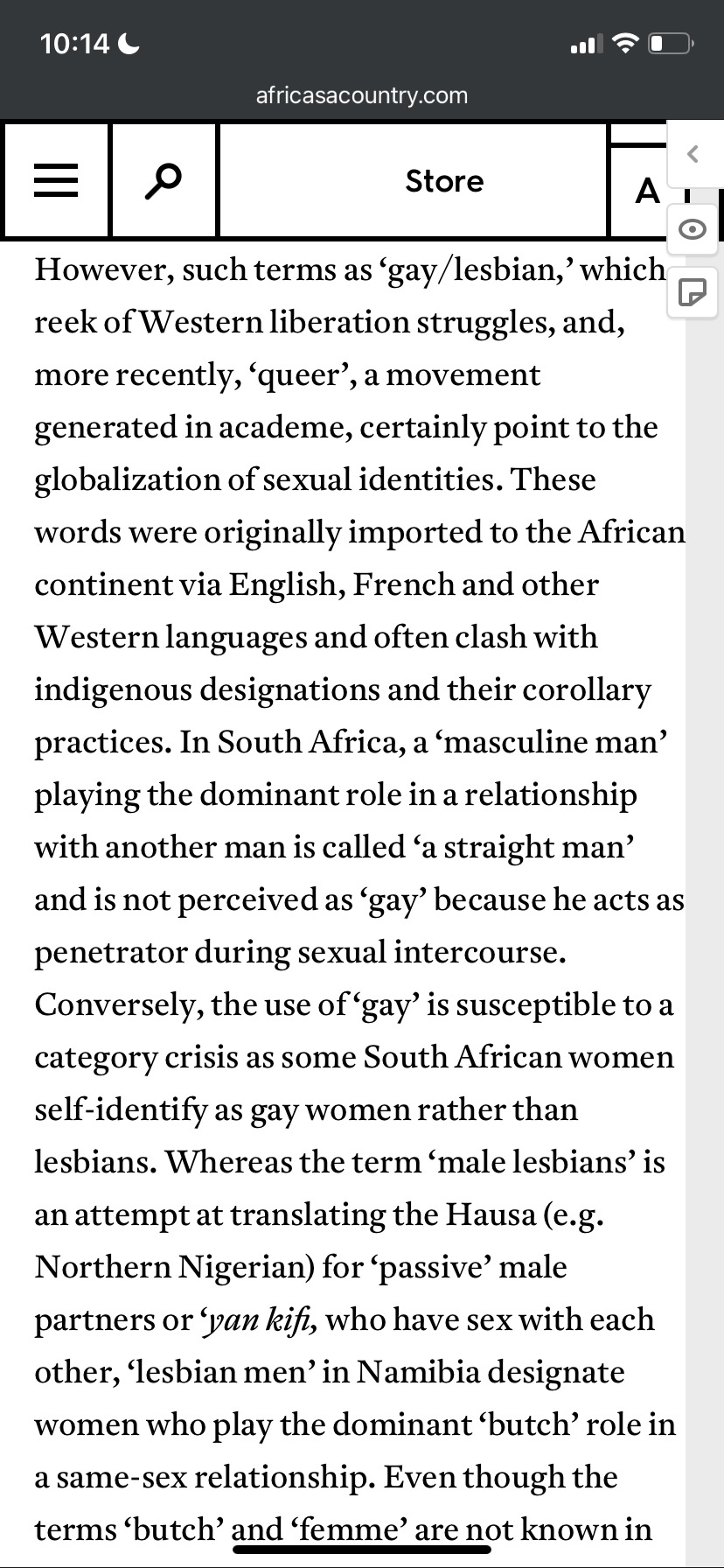
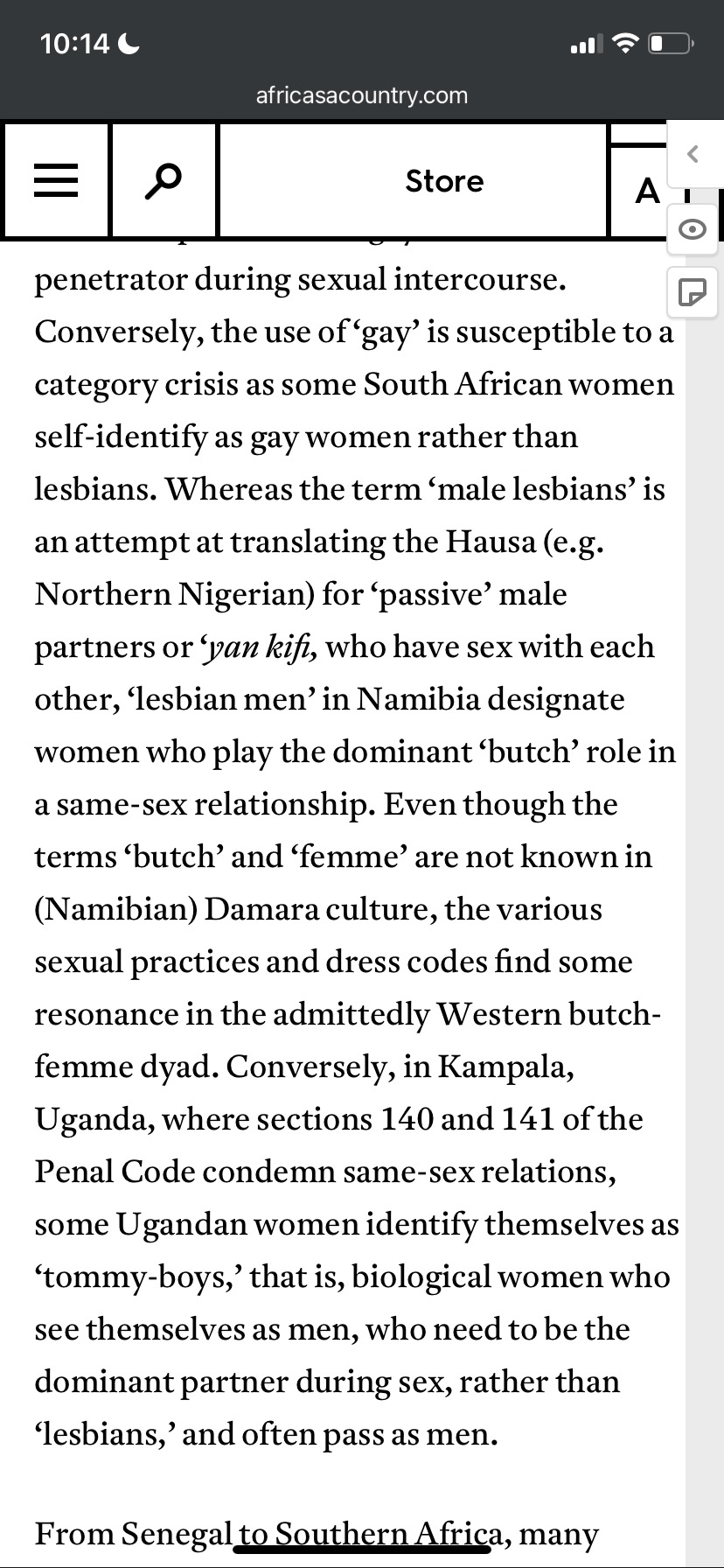
If you were wondering why many lesbians of color are fighting back against identity policing and rightfully calling it out as white supremacy, it is because this rhetoric is dangerous, harmful, and antithetical to our liberation. Invalidating lesbian manhood is rooted in antiBlackness and antiIndigeneity. Excluding lesbians of color for our race and culture is colonization in action. Excluding trans lesbians of color for our cultural gender and sexuality and for being trans in a way that subverts colonial gender systems is racist and transphobic. here is a fantastic article that talks about African gender and sexuality and highlights the existence of male lesbians or lesbian men. As an Indigenous person of triracial descent, I am proud of my Indigenous cultural gender and sexuality, and I will not allow white supremacists and queer assimilationists to erasure the history and cultures of my ancestors. Male lesbians and lesbian men are STILL HERE. We are proudly Black, Brown, and Indigenous! This is our tradition!
https://africasacountry.com/2014/03/africa-has-always-been-more-queer-than-generally-acknowledged
#indigenous#two spirit#black and brown gender#native#native safe space#native gender#cultural gender#male lesbian#lesbian men#lesbian man#non-binary lesbian#genderfluid lesbian#lesbian history#lesbians of color#indigenous genders#queer gender#African diaspora#ftm lesbian#butch lesbian#he him lesbian#identity policing is colonization#protect indigenous traditions#respect indigenous gender#respect cultural gender#colonial gender binary#indigenous gender systems
20 notes
·
View notes
Text
Tired correcting someone on our pronouns today. Unleashed religion war in the community in schools room. But the teacher stood up for me, and so did her ex step daughter.
Not only for gender, but also because we're plural, so we use they.
#transgender#trans#lgbtq#queer#lgbt pride#nonbinary#idk#non binary#enby#pronouns#they/them#trans nonbinary#-🌑Eclipse [they/them]#plurality#plural#plural community#actually plural#plural gang#plural system#simply plural#pluralgang#plural culture is#system#cdd system#dissociative system#did system#fictive heavy system#endogenic system#osdd system#endo safe
39 notes
·
View notes
Note
plural + queer culture is ur parents knowing absolutely nothing about you
It really is
#endos dni#osdd#pdid#did#did system#osddid#pdid system#actually did#traumagenic#actually dissociative#plural culture is#queer
89 notes
·
View notes
Text
If I had a nickel for every character in this series who works to enforce the status quo of their evil many-planet empire while forced by that status quo to use illegal materials to present as a specific gender out of the wider-than-cis-human range of possibilities available to their species, I'd have two nickels, which isn't a lot, but it's weird that it happened twice.
#shaperaverse#the puppetshade chronicles#rainu and zasza#i really love how paul goes#here's an alien society with a complex non-human system of gender and sexuality#now here's a member of that society who doesn't conform to it#absolutely fantastic worldbuilding#it's easy for scifi/fantays writers to invent a culture#and make it very one note#here's the cool thing about these aliens and it's like that for all of them#but for both the kratu and the rhazzis we see them from the point of view#of someone who is essentially a queer person under their system
8 notes
·
View notes
Text
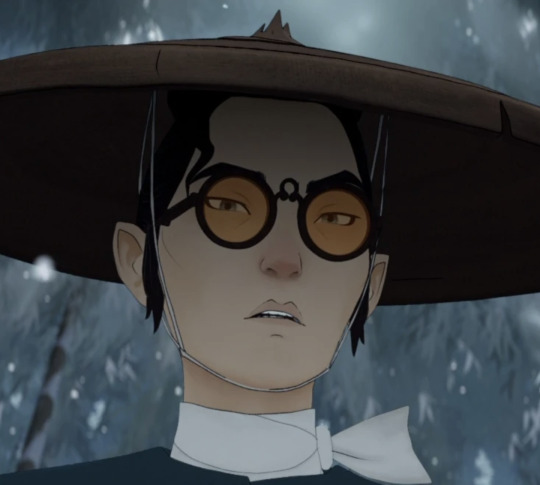
I watched all eight episodes of season 1 of Blue Eye Samurai over the weekend. I then went browsing because I wanted to read some online reviews of the show to see what people were thinking of it and also because I wanted to interact with gifs and art, as the series is visually stunning.
Yet, in my search for opinions on the show, I came across several points I'd like to address in my own words:
Mizu’s history and identity are revealed piece-by-piece and the “peaches” scene with Mizu and Ringo at the lake is intended to be a major character reveal. I think it’s weird that some viewers got angry over other viewers intentionally not gendering Mizu until that reveal, rather than immediately jumping to gender the character as the other characters in the show do. The creators intentionally left Mizu’s gender and sexuality ambiguous (and quite literally wrote in lines to lead audiences to question both) to challenge the viewer’s gut assumption that this lone wolf samurai is a man. That intentional ambiguity will lead to wide and ambiguous interpretations of where Mizu fits in, if Mizu fits in at all. But don't just take my word for this:
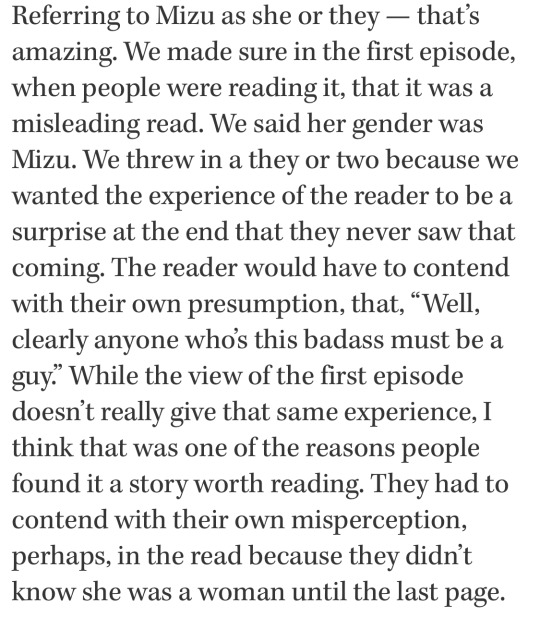
Re: above. I also think it’s weird that some viewers got upset over other viewers continuing to acknowledge that Mizu has a very complicated relationship with her gender, even after that reveal. Canonically, she has a very complicated relationship with her identity. The character is intended to represent liminality in identity, where she’s often between identities in a world of forced binaries that aren’t (widely) socially recognized as binaries. But, again, don’t just take my word for this:
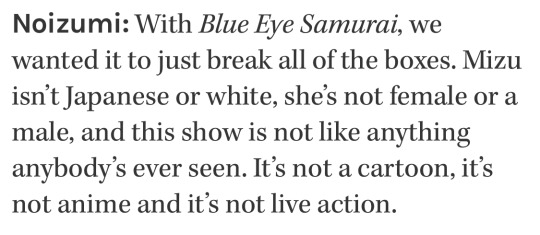
Mizu is both white and Japanese, but she is also not white and not Japanese simultaneously (too white to be Japanese and too Japanese to be white). She’s a woman and a man. She’s a man who’s a woman. She’s also a woman who’s not a woman (yet also not quite a man). But she’s also a woman; the creators said so. Mizu was raised as a boy and grew into a man, yet she was born a girl, and boyhood was imposed upon her. She’s a woman when she’s a man, a man when she’s a man, and a woman when she’s a woman.
Additionally, Mizu straddles the line between human and demon. She’s a human in the sense she’s mortal but a demon in the sense she’s not. She's human yet otherworldly. She's fallible yet greatness. She's both the ronin and the bride, the samurai and the onryō. In short, it’s complicated, and that’s the point. Ignoring that ignores a large part of her internal character struggle and development.
Mizu is intended to represent an “other,” someone who stands outside her society in every way and goes to lengths to hide this “otherness” to get by. Gender is a mask; a tool. She either hides behind a wide-brimmed hat, glasses, and laconic anger, or she hides behind makeup, her dress, and a frown. She fits in nowhere, no matter the identity she assumes. Mizu lives in a very different time period within a very different sociocultural & political system where the concept of gender and the language surrounding it is unlike what we are familiar with in our every-day lives. But, again, don’t just take my word for this:
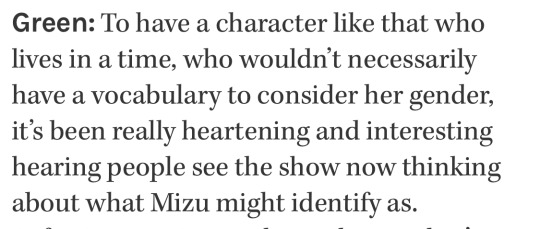
It’s also weird that some viewers have gotten upset over the fact women and queer people (and especially queer women) see themselves in Mizu. Given her complicated relationship with identity under the patriarchy and colonial violence, I think Mizu is a great character for cis-het women and queer folks alike to relate to. Her character is also great for how she breaks the mold on the role of a biracial character in narratives about identity (she’s not some great bridge who will unite everyone). It does not hurt anyone that gender-fluid and nonbinary people see themselves in Mizu's identity and struggle with identity. It does not hurt anyone that lesbians see themselves in the way Mizu expresses her gender. It does not hurt anyone that trans men see themselves in Mizu's relationship with manhood or that trans women can see themselves in Mizu when Mama forces her to be a boy. It's also really cool that cis-het women see themselves in Mizu's struggles to find herself. Those upset over these things are missing critical aspects of Mizu's character and are no different from the other characters in the story. The only time Mizu is herself is when she’s just Mizu (“…her gender was Mizu”), and many of the other characters are unwilling to accept "just Mizu." Accepting her means accepting the complicatedness of her gender.
Being a woman under the patriarchy is complicated and gives women a complicated relationship with their gender and identity. It is dangerous to be a woman. Women face violence for being women. Being someone who challenges sex-prescribed norms and roles under patriarchy also gives someone a complicated relationship with their identity. It is dangerous to usurp gender norms and roles (then combine that with being a woman...). People who challenge the strict boxes they're assigned face violence for existing, too. Being a racial or ethnic minority in a racially homogeneous political system additionally gives someone a complicated relationship with their identity. It is dangerous to be an ethnic minority when the political system is reproduced on your exclusion and otherness. They, too, face violence for the circumstances of their birth. All of these things are true. None of them take away from the other.
Mizu is young-- in her early 20s-- and she has been hurt in deeply affecting ways. She's angry because she's been hurt in so many different ways. She's been hurt by gender violence, like "mama's" misogyny and the situation of her birth (her mother's rape and her near murder as a child), not to mention the violent and dehumanizing treatment of the women around her. She's been hurt by racial violence, like the way she has been tormented and abused since childhood for the way she looks (with people twice trying to kill her for this before adulthood). She's been hurt by state-sanctioned violence as she faces off against the opium, flesh, and black market traders working with white men in contravention of the Shogun's very policies, yet with sanction from the Shogun. She's been hurt by colonial violence, like the circumstances of her birth and the flood of human trafficking and weapons and drug trafficking in her country. She's had men break her bones and knock her down before, but only Fowler sexually differentiated her based on bone density and fracture.
Mizu also straddles the line between victim and murderer.
It seems like Mizu finding her 'feminine' and coming to terms with her 'female side' may be a part of her future character development. Women who feel caged by modern patriarchal systems and alienated from their bodies due to the patriarchy will see themselves in Mizu. They understand a desire for freedom that the narrow archetypes of the patriarchy do not afford them as women, and they see their anger and their desire for freedom in Mizu. This, especially considering that Mizu's development was driven by one of the creators' own experiences with womanhood:
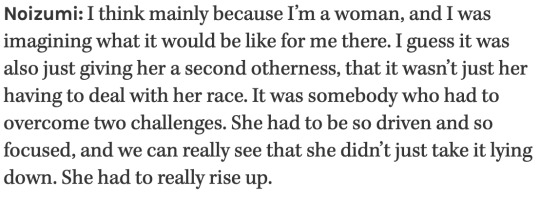
No, Mizu does not pass as a man because she "hates women" or because she hates herself as a woman or being a woman. There are actual on-screen depictions of Mizu's misogyny, like her interactions with Akemi, and dressing like a man is not an instance of this. Mizu shows no discomfort with being a woman or being seen as a woman, especially when she intends to pass herself as and present as a woman. Mizu also shows the women in the series more grace and consideration than any man in the show, in whatever capacity available to her socially and politically, without revealing herself; many of the women have remarked that she is quite unlike other men, and she's okay with that, too.
When she lives on the farm with Mama and Mikio, Mizu shows no discomfort once she acclimates to the new life. But people take this as conclusive evidence of the "only time" she was happy. She was not. This life was also a dance, a performance. The story of her being both the ronin and the onryō revealed to the audience that this lifestyle also requires her to wear a mask and dance, just as the bride does. This mask is makeup, a wedding dress, and submission, and this performance is her gender as a wife. She still understands that she cannot fully be herself and only begins to express happiness and shed her reservation when she believes she is finally safe to be herself. Only to be betrayed. Being a man is her safety, and it is familiar. Being a boy protected her from the white men as a child, and it might protect her heart now.
Mizu shows no discomfort with being known as a woman, except when it potentially threatens her goals (see Ringo and the "peaches" scene). She also shows no discomfort with being known as, seen as, or referred to as a man. As an adult, she seems okay- even familiar- with people assuming she's a man and placing her into the role of a man. Yet, being born a girl who has boyhood violently imposed upon her (she did not choose what mama did to her) is also an incredibly important part of her lived experience. Being forced into boyhood, but growing into a man anyway became part of who she is. But, being a man isn’t just a part of who she became; it’s also expedient for her goals because men and women are ontologically different in her world and the system she lives under.
She's both because she's neither, because- ontologically- she fits nowhere. When other characters point out how "unlike" a man she is, she just shrugs it off, but not in a "well, yeah, because I'm NOT a man" sort of way, but in an "I'm unlike anyone, period," sort of way. She also does not seem offended by Madam Kaji saying that Mizu’s more man than any who have walked through her door.
(Mizu doesn’t even see herself as human, let alone a woman, as so defined by her society. And knowing that creators have stated her future arc is about coming into her “feminine era” or energy, I am actually scared that this show might fall into the trope of “domesticating”/“taming” the independent woman, complete with an allegory that her anger and lack of human-ness [in Mizu’s mind] is a result of a woman having too much “masculine energy” or being masculine in contravention of womanness.)
Some also seem to forget that once Mama and Mikio are dead, no one knows who she is or where she came from. They do not have her background, and they do not know about the bounty on her (who levied the bounty and why has not yet been explained). After their deaths, she could have gone free and started anew somehow. But in that moment, she chose to go back to life as a man and chose to pursue revenge for the circumstances of her birth. Going forward, this identity is no longer imposed upon her by Mama, or a result of erroneous conclusions from local kids and Master Eiji; it was because she wanted people to see her as a man and she was familiar with navigating her world, and thus her future, as a man. And it was because she was angry, too, and only men can act on their anger.
I do think it important to note that Mizu really began to allow herself to be vulnerable and open as a woman, until she was betrayed. The question I've been rattling around is: is this because she began to feel safe for the first time in her life, or is this part of how she sees women ontologically? Because she immediately returns to being a man and emotionally hard following her betrayal. But, she does seem willing to confide in Master Eiji, seek his advice, and convey her anxieties to him.
Being a man also confines Mizu to strict social boxes, and passing herself as a man is also dangerous.
Mizu doesn't suddenly get to do everything and anything she wants because she passes as a man. She has to consider her safety and the danger of her sex being "found out." She must also consider what will draw unnecessary attention to her and distract her from her goals. Many viewers, for example, were indignant that she did not offer to chaperone the mother and daughter and, instead, left them to the cold, only to drop some money at their feet later. The indignity fails consider that while she could bribe herself inside while passing as a man, she could not bribe in two strangers. Mizu is a strange man to that woman and does not necessarily have the social position to advocate for the mother and daughter. She also must consider that causing small social stirs would distract from her goals and draw certain attention to her. Mizu is also on a dangerous and violent quest.
Edo Japan was governed by strict class, age, and gender rules. Those rules applied to men as well as women. Mizu is still expected to act within these strict rules when she's a man. Being a man might allow her to pursue revenge, but she's still expected to put herself forward as a man, and that means following all the specific rules that apply to her class as a samurai, an artisan (or artist), and a man. That wide-brimmed hat, those orange-tinted glasses, and her laconic tendencies are also part of a performance. Being a boy is the first mask she wore and dance she performed, and she was originally (and tragically) forced into it.
Challenging the normative identities of her society does not guarantee her safety. She has limitations because of her "otherness," and the transgression of sex-prescribed roles has often landed people in hot water as opposed to saving them from boiling. Mizu is passing herself off as a man every day of her life at great risk to her. If her sex is "found out" on a larger scale, society won’t resort to or just start treating her as a woman. There are far worse fates than being perceived as a woman, and hers would not simply be a tsk-tsk, slap on the wrist; now you have to wear makeup. Let's not treat being a woman-- even with all the pressures, standards, fears, and risks that come with existing as a woman-- as the worst consequence for being ‘found out’ for transgressing normative identity.
The violence Mizu would face upon being "found out" won’t only be a consequence of being a "girl." Consider not just the fact she is female and “cross-dressing” (outside of theater), but also that she is a racial minority.
I also feel like many cis-het people either ignore or just cannot see the queerness in challenging gender roles (and thus also in stories that revolve around a subversion of sex-prescribed gender). They may not know how queerness-- or "otherness"-- leads to challenging strict social stratifications and binaries nor how challenging them is seen by the larger society as queer ("strange," "suspicious," "unconventional," even "dishonorable," and "fraudulent"), even when "queerness" (as in LGBTQ+) was not yet a concept as we understand it today.
Gender and sexuality- and the language we use to communicate who we are- varies greatly across time and culture. Edo Japan was governed by strict rules on what hairstyles, clothes, and weapons could be worn by which gender, age, and social group, and this was often enshrined in law. There were specific rules about who could have sex with whom and how. These values and rules were distinctly Japanese and would not incorporate Western influences until the late 1800s. Class was one of the most consequential features to define a person's fate in feudal Japan, and gender was quite stratified. This does not mean it's inappropriate for genderqueer people to see themselves in Mizu, nor does this mean that gender-variant identities didn’t exist in Edo Japan.
People in the past did not use the same language we do today to refer to themselves. Example: Alexander The Great did not call himself a "bisexual." We all understand this. However, there is a very weird trend of people using these differences in language and cultures across time to deny aspects of a historical person's life that societies today consider taboo, whether these aspects were considered taboo during that historical time period or not. Same example: people on Twitter complaining that Netflix "made" Alexander The Great "gay," and after people push back and point out that the man did, in fact, love and fuck men, hitting back with "homosexuality wasn't even a word back then" or "modern identity didn't exist back then." Sure, that word did not exist in 300s BCE Macedonia, but that doesn't mean the man didn't love men, nor does that mean that we can't recognize that he'd be considered "queer" by today's standards and language.
Genderqueer, as a word and as the concept is understood today, did not exist in feudal Japan, but the people did and feudal Japan had its own terms and concepts that referred to gender variance. But while the show takes place in Edo Japan, it is a modern adult animation series made by a French studio and two Americans (nationality). Mizu is additionally a fictional character, not a historical figure. She was not created in a vacuum. She was created in the 21st century and co-written by a man who got his start writing for Sex in the City and hails from a country that is in the midst of a giant moral panic about genderqueer/gender-variant people and gender non-conforming people.
This series was created by two Americans (nationality) for an American company. In some parts of that country, there are laws on the book strictly defining the bounds of men and women and dictating what clothes men and women could be prosecuted for wearing. Changes in language and identity over time mean that we can recognize that if Mizu lived in modern Texas, the law would consider her a drag performer, and modern political movements in the show creators' home country would include her under the queer umbrella.
So, yeah, there will also be genderqueer people who see themselves in Mizu, and there will be genderqueer fans who are firm about Mizu being queer to them and in their “headcanons.” The scene setting being Edo Japan, does not negate the modern ideas that influence the show. "Nonbinary didn't exist in Edo Japan" completely ignores that this show was created to explore the liminality of modern racial, gender, class, and normative identities. One of the creators was literally inspired by her own relationship with her biracial identity.
Ultimately, the fact Mizu, at this point in her journey, chooses to present and pass as a man and the fact her presented gender affects relationship dynamics with other characters (see: Taigen) gives this story a queer undertone. And this may have been largely unintentional: "She’s a girl, and he’s a guy, so, of course, they get together," < ignoring how said guy thinks she’s a guy and that she intentionally passes herself as a guy. Audiences ARE going to interpret this as queer because WE don’t live in Edo-era Japan. And I feel like people forget that Mizu can be a woman and the story can still have queer undertones to it at the same time.
#Blue Eye Samurai#‘If I was transported back in time… I’d try to pass myself off as a man for greater freedom.’#^^^ does not consider the intersection of historically queer existence across time with other identities (& the limitations those include)#nor does it consider the danger of such an action#I get it. some come to this conclusion simply because they know how dangerous it is to be a woman throughout history.#but rebuking the normative identities of that time period also puts you at great risk of violence#challenging norms and rules and social & political hierarchies does not make you safer#and it has always been those who exist in the margins of society who have challenged sociocultural systems#it has always been those at greatest risk and who've faced great violence already. like Mizu#Anyway... Mizu is just Mizu#she is gender queer (or gender-variant)#because her relationship with her gender is queer. because she is gender-variant#‘queer’ as a social/political class did not exist. but people WE understand as queer existed in different historical eras#and under different cultural systems#she’s a woman because queer did not exist & ‘woman’ was the sex caste she was born into#she’s also a woman because she conceptualizes herself as so#she is a woman AND she is gender-variant#she quite literally challenges normative identity and is a clear example of what sex non-conforming means#Before the actual. historic Tokugawa shogunate banned women from theater#there were women in the theater who cross-dressed for the theater and played male roles#so I’m also really tired of seeing takes along the lines of: ‘Edo Japan was backwards so cross dressers did’t exist then!’#like. please. be more transparent won’t you?
21 notes
·
View notes